St Andrews Can Do
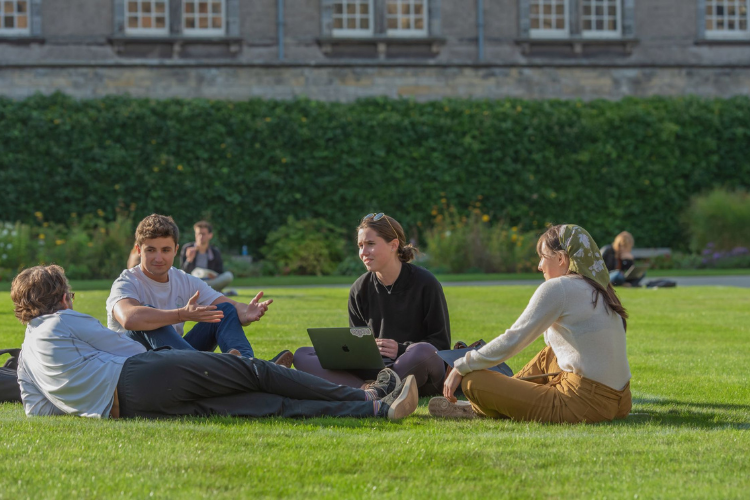
“We’re a leading University and it makes sense that we’re trying to lead through the pandemic too.”
Gavin Sandford, Director of Student Development and Activities
“This is our collective inheritance, and we all have a role to play in reinterpreting it for a changing world.”
Dr Monique Mackenzie, Assistant Vice-Principal (Provost)
In a time when most of us were being told what we couldn’t do, the University of St Andrews took the bold step of taking on a new ‘Can Do’ mantra during the Covid-19 outbreak. The innovative approach – a joint initiative between the University and the Students’ Association – was established primarily to help our students reimagine, experiment with, and contribute to the unique St Andrews student experience.
During a time of restriction, confusion and change, the Can Do approach was a welcome – and brave – new development, undertaken with the typical St Andrews’ spirit of inclusion, collaboration, excellence and innovation.
The genesis of the approach was borne in September of 2020, six months after students and staff were first separated from ‘the Bubble’ and forming safe bubbles of their own, wherever they were in the world. Teaching had switched to online for the first time in the University’s history and Semester 2 had halted abruptly, with all-important rites of passage, such as the May Dip, in-person exams, after-exam soakings, pier walks, balls and graduation as we know it no longer possible.
With the combined effect of these disappointments and a growing sense of discontent with life in lockdown, it was clear that students were missing out considerably on the ‘St Andrews experience’.
Although the University had already returned to the delivery of in-person teaching (where possible) in Semester 1, with staff working around the clock and under extraordinary circumstances to do this safely, it was felt that the University, as a community, could still do more.
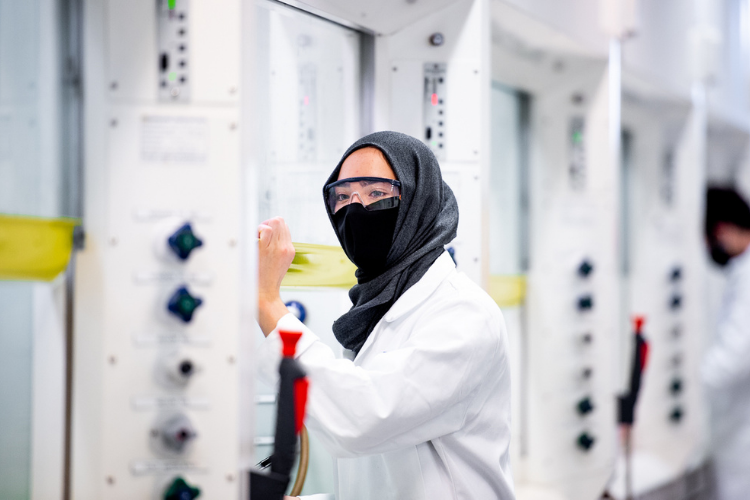
We aim ever to excel, and to demonstrate leadership, creativity and an entrepreneurial spirit, even during the most challenging of times.
In one of her weekly messages to the University community, the Principal announced the development, saying: “It’s my hope that the Can Do programme, devised with a great deal of effort and support from your Students’ Association, will signal an end to some of the turbulence and uncertainty which the pandemic has brought to the start of semester, and provide an outlet for your natural inventiveness, a quality for which St Andrews students are renowned.”
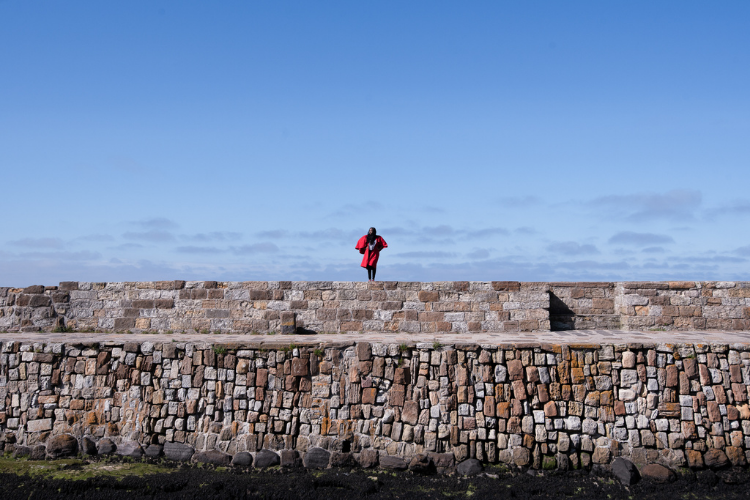
The initial idea was, circumstances notwithstanding, a simple one: to create a warm and safe place in which students could organise and attend Covid-safe events, both co-curricular and extra-curricular. Secondly, these events would need to be supported and constantly monitored in order to adhere to the ever-changing Government guidelines and, most importantly, continue to protect the wider St Andrews’ community.
Enter stage left – or via kitchen tables in St Andrews and beyond – the Can Do Committee, a taskforce comprising members from across the University, who were charged with taking on the job of the impossible: being positive in a pandemic.
The challenge of the Can Do Committee, which included members of the ACE (Accommodation, Conferences and Events) team, the Principal’s Office and the Students’ Association, was twofold: to create opportunities for St Andrews students to take the lead in adapting to these unprecedented times, and to maintain the University’s commitment to keep an entire community as safe as possible. The Committee was supported throughout by the University’s Deputy Legal Officer Mike Gettinby, who not only had to keep constantly up to date with Scottish Government guidance, but was an endless source of ideas and provider of legal options to enable student activity and events to take place.
The challenge was in no small part met thanks to the generous donations of alumni and supporters through the University’s Covid Appeal and the St Andrews Can Do Fund, which highlighted the need to combat the strain of loneliness during periods of lockdown.
After just a few short weeks of intense planning and discussion, the initiative resulted in the development of a fully facilitated programme of events, a safe, new space to hold them in, a Can Do helpdesk and a Can Do guide designed to make sure events were held within the current guidelines.
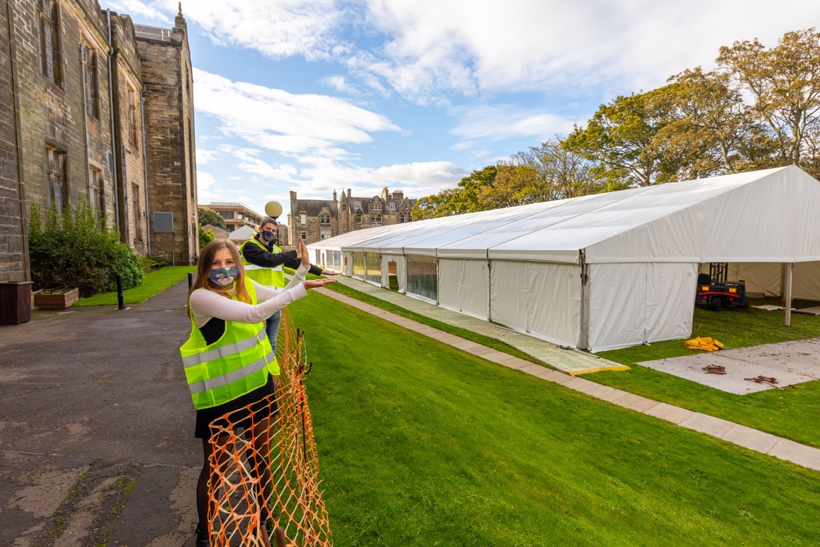
The Can Do guide was launched in October 2020 with advice on holding events and instructions on booking spaces in the Libraries, The Byre Theatre and the Students’ Association.
One giant marquee, four event pods named after famous St Andrews cats, 35 socially distanced hearts and one giant inflatable lobster later, the programme was live and, for the first-time in months, physical.
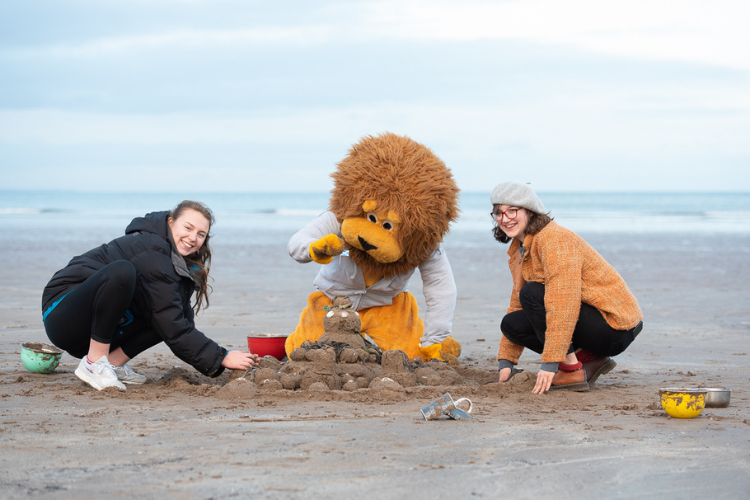
The ambitious joint effort supported students and staff in the planning and execution of activities with a range of creative solutions, resources and the all-important Covid-19 safety training. Activities were approved on the basis of a number of parameters including safety, diversity and whether events added to a student’s graduate attributes, such as being socially responsible.
Before the close of 2020, almost 200 student societies and 66 staff Units or Schools organised more than 500 events, taking full advantage of the Covid-19 compliant space on offer. Almost 3000 members of the University community were recorded under Track and Trace as having attended an event in the Can Do marquee alone. Further spaces, including external facilities, the Sports Centre and outdoor ‘venues’ such as the West Sands, hosted additional events, including free driving range sessions, charity sandcastle-building competitions and water sports.
From debates to dance classes, first aid sessions to film showings, pumpkin carving to planet-watching, those students remaining in St Andrews excelled in their use of the free facilities. With more than 150 societies and eleven subcommittees, St Andrews’ students are renowned for their work hard, play hard ethic; unsurprisingly, even during a global pandemic they embraced the opportunity to do something. Our Saints engaged their renowned entrepreneurial and imaginative spirits, with literally something for everyone – fancy ballroom dancing in your pyjamas, body positive crafting, French tarot, Czech cookie-decorating or a game of Feminist Bingo? Yes, We Can!
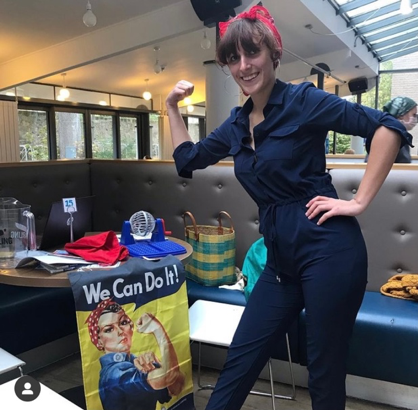
Events were topical, ethical and socially responsible too, and included consent workshops, MSP letter writing sessions, information sessions for BAME students and stim toy-making with the Disabled Students Network. Discussions were held on racism, breast cancer, diversity, affordable student housing, work-life balance, climate change, Queer faith and cooking on a budget, while groups watched everything from Russian cartoons and documentaries on Beyoncé to the US Presidential election live results. And, on the practical side, group revision sessions were hosted, as well as those aimed at improving interview skills, public speaking and exam preparation. Ever aware of the importance of mental health and wellbeing, classes on mindfulness, resilience and reflection were also held, in both indoor and outdoor spaces.
Meanwhile, physical events outwith the Can Do space on Lower College Lawn included the re-opening of the University’s unique Victorian natural history museum and the weekly Hearts of Light solidarity event, with online lectures, society events and film showings continuing as before. And outside of the official Can Do calendar, student communities and societies across the spectrum continued to organise their own events, and maintain all-important connections with friends and colleagues, via Facebook Live, MS Teams, Zoom and webinar sessions.
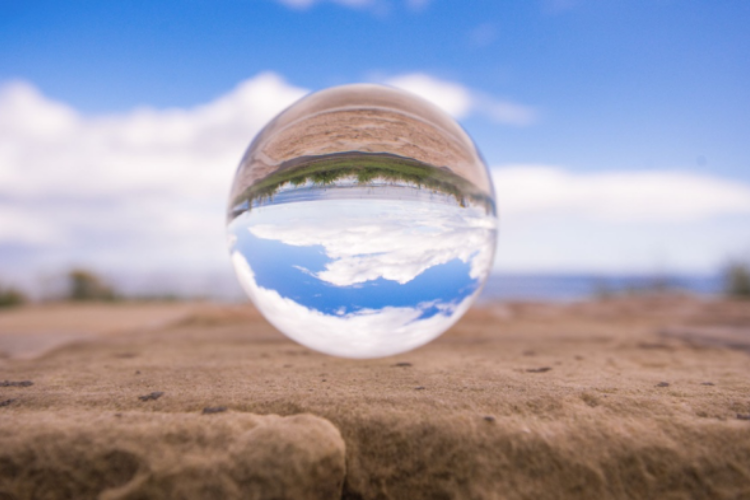
Gavin Sandford, Director of Student Development and Activities for the Students’ Association, commented: “I think that during the pandemic there’s been a lot of misunderstanding around the restrictions – thinking that they have been either much stricter or more relaxed than they were. The Can Do approach has really helped us show students what’s possible while keeping everything safe and controlled. I feel like it’s been setting a good example that increases awareness of what can be done within the restrictions.
“I think honestly the scope of what we were doing was the biggest challenge we faced. In the first couple of meetings the idea was incredible, but it also seemed so crazy. ACE have run events before, but a project like the Can Do Marquee was so new to many of us. There was a lot of planning involved – at one point I realised I’d spent a whole week doing nothing but Can Do stuff – but I’m glad to see how it all worked out.
“This project really has been about ideas, and there’s been a great atmosphere where all sorts of crazy ideas have been proposed, but I don’t want to spoil anything in case it comes to fruition! We’re certainly trying to look at what other Universities are doing in case there are any bright ideas and I’d expect that the great work we’ve been doing here can act as inspiration for other institutions.”
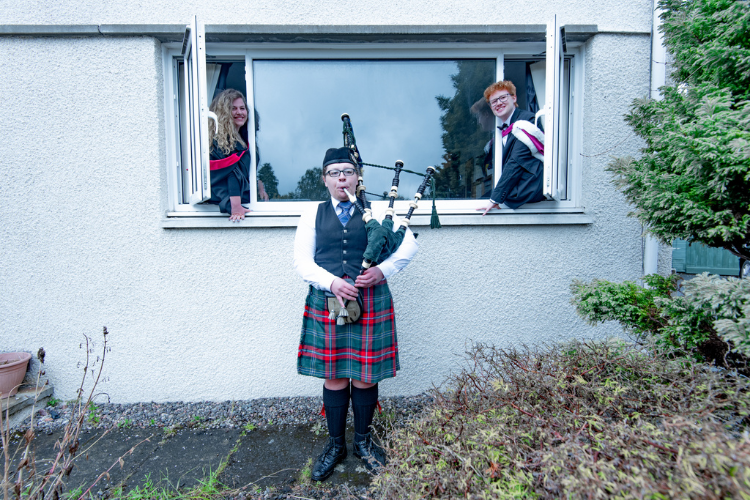
“The ‘bubble’ has been a great place to do something like this. Because we’re quite self-contained, the students have lots of experience working with the University. We’ve kept the situation under control within the student community and there’s been much less external risk than you might find in a big city. I think that the students have really understood this responsibility we have to keep everyone safe and have done a fantastic job in working with the University.
“Under Tier 4, we can still share our experiences with others. Even if you’ve gone on a walk on your own you can connect with people who have done something similar and share suggestions of where to go and what to do.
“I think everyone’s looking forward to just being able to meet in person again. We’ll see what happens, but there are certain traditions that would be great to bring under Can Do this semester to allow them to continue in some way or another.
“I think what makes St Andrews a great University is the focus on the students, and this project is showing that the way to be successful is to listen to what students want and work towards creating the best student experience. We’re a leading University and it makes sense that we’re trying to lead through the pandemic too.”
Assistant Vice-Principal (Provost) Dr Monique Mackenzie, Chair of the Can Do Committee, worked closely with her team of students, academic and non-academic staff.
She said: “Our challenge, as a community, was to demonstrate what we can do within existing parameters set by the Scottish Government by working together, thinking creatively, and developing our reputation for leadership, adaptability and resilience.
“We wanted to help our community make the most of this opportunity to radically reimagine, experiment with, and contribute to the unique student experience at St Andrews. This is our collective inheritance, and we all have a role to play in reinterpreting it for a changing world.”
The biggest challenge facing staff was the ‘ever-changing government guidelines’ and the need to quickly adapt events and spaces as required. When Fife was placed under Tier 4 restrictions just before the Christmas break, all in-person indoor Can Do events were either cancelled or moved online. It is hoped that, once restrictions are eased, the St Andrews’ Can Do approach will return in full flow, so that students can once again connect in meaningful, physical ways, in order to meet the criteria of the NHS’s ‘5 steps to mental wellbeing’.
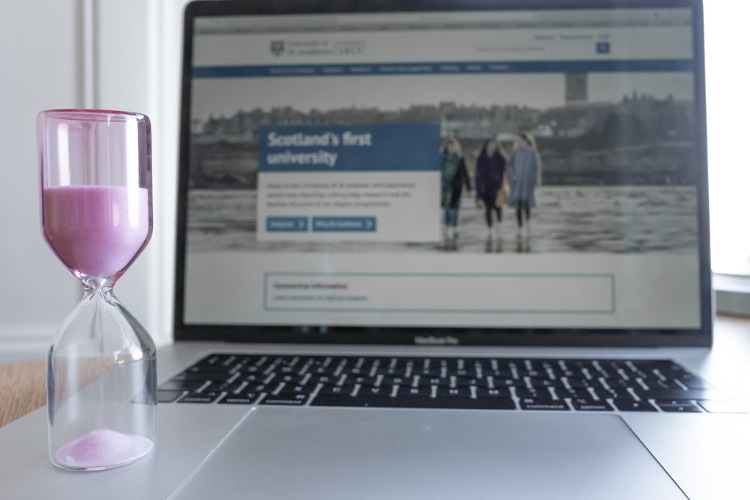
Project Manager Team Leader (Business Transformation Portfolio Office), Lindsay Wilson, said:”The Can Do initiative is designed to support student wellbeing and emotional health through the provision of educational activities in a warm, safe environment. With students under more stress than normal, a positive approach to quality of life as well as overall development remains central to Can Do. We are still supporting online or outdoors in-person activities, such as wellbeing walks, and will support in-person activities once Tier 4 lockdown restrictions are lifted.”
Find out more about St CANdrews
For further information on the Can Do initiative, including advice on hosting an event, email [email protected] or join the Teams channel. Upcoming events – held under current Covid-19 restrictions – are published on the University events calendar.
The latest coronavirus guidance is kept up to date and published on the University website.
Words and photos throughout (unless otherwise stated) by Gayle McIntyre, Corporate Communications. Design by the Digital Communications team. Special thanks to Lauren Sykes, all interviewees, photographic subjects and contributors and the Can Do team.
Contact
Email: [email protected]
Phone: +44 (0)1334 46 7323